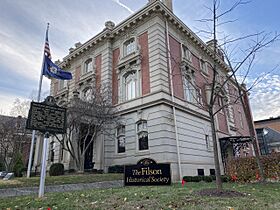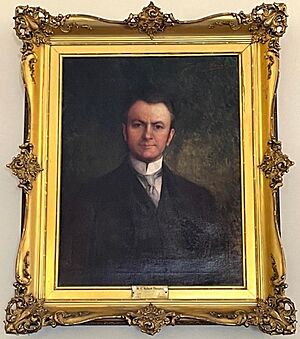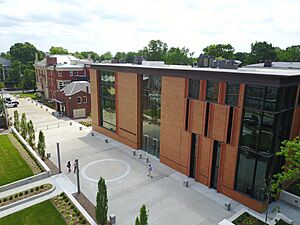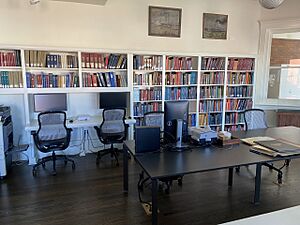The Filson Historical Society facts for kids

The Ferguson Mansion, home of the Filson Historical Society in Old Louisville
|
|
| Former name | The Filson Club |
|---|---|
| Established | 1884 |
| Location | 1310 South 3rd Street Louisville, Kentucky 40208 |
| Type | History museum |
| Founder |
|
| Public transit access | TARC |
The Filson Historical Society, once known as The Filson Club, is a special place in Louisville, Kentucky. It's a private group that helps adults keep learning about history. It was started in 1884. The Filson shares history through a journal, a magazine, talks, tours, and exhibits.
Contents
What the Filson Does
The Filson's main goal is to gather, protect, and share stories about Kentucky and the Ohio Valley. They host events and shows that explore the past in an honest way.
Programs and Events
The Filson offers many cool programs:
- The Gertrude Polk Brown lecture series brings in famous authors.
- The Notable Louisville Neighborhoods series helps people connect with local history.
- Workshops teach you how to save your family's history or care for old photos.
- They also have concerts with local artists.
- Authors and historians talk about the history of the Ohio River valley.
History of the Filson Society
The Filson Club began on May 15, 1884. Ten men who loved history started it. Reuben T. Durrett was the main founder and first president.
Why the Name "Filson"?
The group was named after John Filson. He was Kentucky's first English-speaking historian. He wrote a book and made a map of Kentucky in 1784. The club started 100 years after his historical works.
Early Days and Moves
From 1884 to 1913, members met at Reuben Durrett's home in Louisville. He had a huge collection of historical items there.
In 1913, Durrett's collection was sold to the University of Chicago. This happened because Louisville didn't have a fireproof place to store old documents. Sadly, some of the Filson Club's own items went with Durrett's collection.
The Filson's remaining items moved to the library of Rogers Clark Ballard Thruston. He was the Filson's Vice President. His library was in the Columbia Building until 1929.
A New Home
Mr. Thruston and other members knew they needed their own building. They raised money in 1926. In June 1929, the Filson's items and Mr. Thruston's collection moved to a new home. This was at 118 West Breckinridge Street. An architect changed two old houses into one large Georgian-style building. It held the Filson's archives, library, museum, and offices.
Moving to the Ferguson Mansion
As the collection grew, the Filson needed an even bigger space. In 1984, the Filson bought the Edwin Hite Ferguson Mansion. This was the Filson's 100th birthday! The mansion was renovated and new storage areas were added in 1985. In 1986, the Filson moved into its current home. The mansion became offices and library storage. A smaller building, the carriage house, was used for more storage and displays.
The Ferguson Mansion was built in 1905. It's a beautiful example of Beaux-Arts architecture. It was first built for a businessman named Edwin Hite Ferguson. Over the years, it was a funeral home and even a campaign office for a governor. The Filson bought it in 1984.
Growing and Expanding
Through the 1980s and 1990s, the Filson's collections and staff kept growing. The name changed from "Club" to "Historical Society." This showed their new focus on serious historical research.
In the 2010s, the Filson expanded its campus. They renovated the mansion and built the Owsley Brown II History Center. This new center has galleries, reading rooms, and event spaces.
The Filson opened its updated campus and the new Owsley Brown II History Center in October 2016.
In 2017, the Filson started a new project. They began collecting and studying the history of Jewish life in Louisville and the Ohio Valley. This is called the Jewish Community Archive.
In 2020, the Filson shared historical information about racial fairness in Louisville. This was in response to protests about police actions.
Connection to Oxmoor Farm
The Filson Historical Society has a special link with the Bullitt family and Oxmoor Farm. This historic farm has a mansion built in 1791. It stayed in the Bullitt family for many generations.
The Filson doesn't own the farm. But the president of the Filson helps advise on its care. The Filson also received support from the Bullitt family. This helps them create programs and research about Kentucky history. They also received the Bullitt family's old papers, which are very important historical documents. The Filson holds events at Oxmoor Farm each year.
Filson's Collections
The Filson Historical Society has a huge collection of historical items. It includes about 2.1 million documents, photos, and prints. There are also 50,000 books, 10,000 museum items, and 400 portraits.
The Filson started collecting history soon after it began in 1884. Many early members came from important Kentucky families. This helped them gather many original letters, diaries, and business records. Their collections from the late 1700s to the mid-1800s are the best in Kentucky.
What's in the Collection?
The collection mainly focuses on Kentucky, the Ohio Valley, and the Upland South. But it also has items from across the country and even the world. Researchers from everywhere visit each year.
The Filson's unique items are very important for people studying:
- The frontier beyond the Appalachian Mountains.
- The Lewis and Clark Expedition.
- Slavery and freedom before the Civil War.
- Jewish history in the South.
- Old buildings and design.
- City improvements in the early 1900s.
- Women's right to vote.
- Local theater, music, and books.
- River and train travel.
- Military history from the 1700s to the 1900s.
Besides old papers and rare books, the Filson has a museum collection. This includes early Kentucky portraits, art from Ohio Valley artists, and old clothes.
Online Resources and Research
The Filson's website lists many of its collections. You can search for old papers and see digital photos. They also have a library catalog for rare books. The Ohio Valley History journal often writes about new items in the collection.
Since 2001, the Filson has helped scholars do research. They have a fellowship program that has supported over 250 researchers. These scholars come from all over the world.
See also
- List of attractions and events in the Louisville metropolitan area
- List of museums in the Louisville metropolitan area
- List of historical societies in Kentucky
- List of museums in Kentucky
 | Bessie Coleman |
 | Spann Watson |
 | Jill E. Brown |
 | Sherman W. White |




